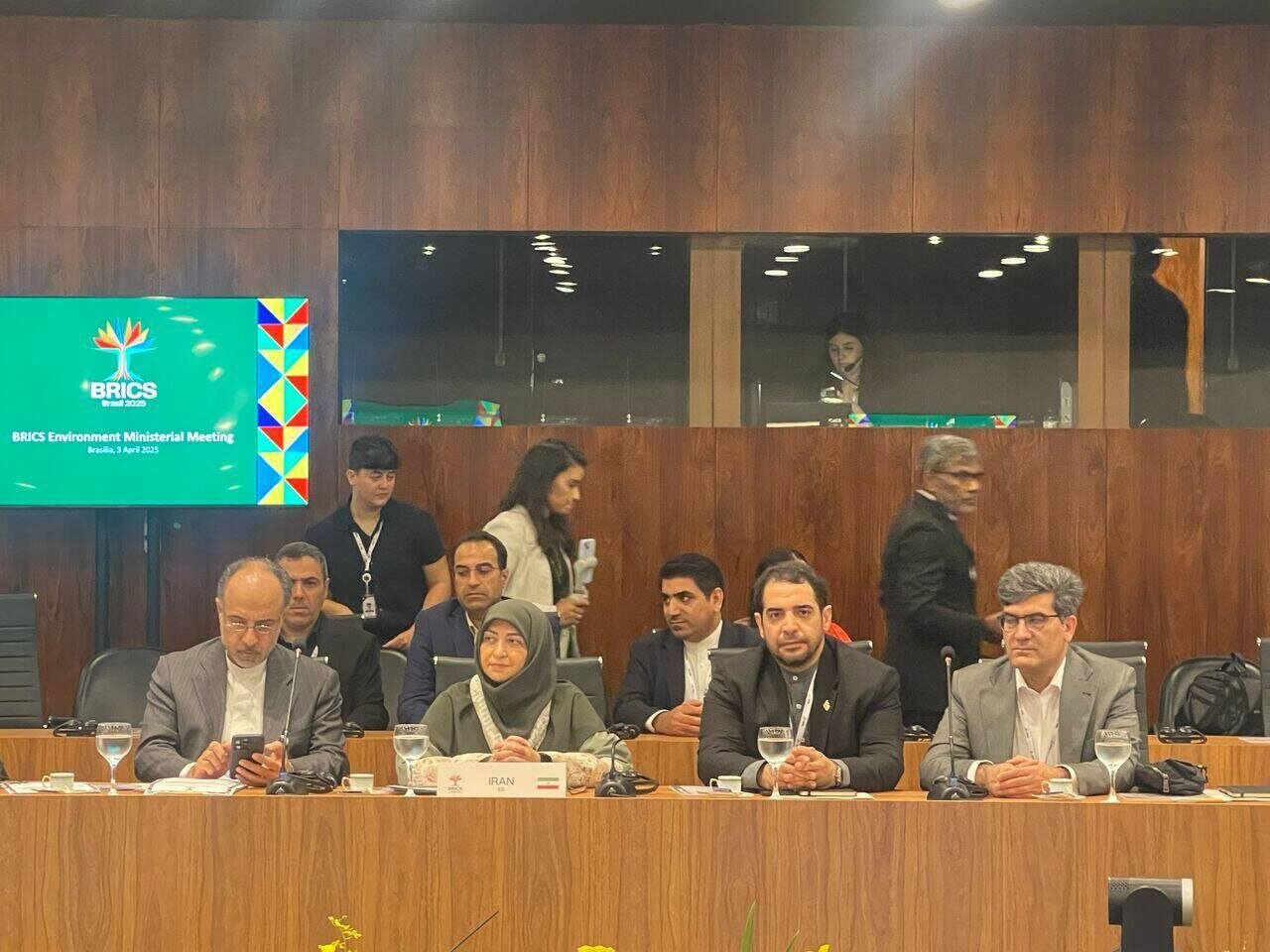Iran proposes BRICS to establish green innovation, plastic waste management funds

TEHRAN –Shina Ansari, the head of the Department of Environment (DOE), has suggested member states of BRICS set up a joint green innovation fund for supporting projects on climate change adaptation in developing countries, and a global fund for managing plastic pollution.
Addressing the 11th BRICS Environment Working Group (EWG), which took place on April 1 and 2 in Brazil, the official said the current meetings provide a great opportunity for member countries of the BRICS group to make fair, realistic, and comprehensive decisions to tackle shared environmental challenges at a global level.
The United Nations’ agenda on the three major issues including climate change, biodiversity loss, and pollution features the realities of the world which necessitates providing financial resources, transferring technology and capacity building, as well as strengthening international cooperation for economic and social development along with preserving the environment.
However, unilateral and unfair restrictions on international trade under the guise of environmental protection have caused numerous problems and challenges, IRNA quoted Ansari as saying.
“The movement towards a green transition is a crucial step in tackling climate change and lowering carbon emissions. It requires adopting low-carbon energy sources, improving energy efficiency, and supporting sustainable urban planning and transport systems.
Adopting these initiatives can effectively mitigate the impacts of climate change while creating new economic opportunities and improving the quality of life of communities around the world. Therefore, BRICS is expected to play an important role in providing technical, financial, and advisory assistance, including knowledge exchange, implementing joint projects, exchanging professional expertise, and strengthening cooperation,” she noted.
Apart from designing a system to fund climate projects, Ansari proposed establishing a clean technology transfer center that would facilitate equitable access to the latest carbon reduction technologies, and a joint environmental monitoring platform, utilizing remote sensing and artificial intelligence to manage transboundary crises, developing new international legal framework and introducing a ban on sanctions against environmental projects.
The official went on to elaborate on the country’s commitment to sustainable development, saying that Iran has taken great strides, such as the expansion of renewable energies, protection of biodiversity, the increase in the number of national protected areas, as well as addressing sand and dust storms, to conserve the environment.
“However, Iran is among the most vulnerable and severely affected countries by the climate change which has led to prolonged droughts, sand and dust storms, loss of biodiversity, severe reductions in river flows, and over-extraction of groundwater resources,” Ansari added.
The official also announced Iran’s readiness to foster environmental cooperation with BRICS and host BRICS experts meeting to develop a joint action plan, share knowledge on critical issues, such as water scarcity, as well as develop sustainable financial solutions.
On the sidelines of the event, Ansari held a meeting with the Brazilian Minister of Environment and Climate Change, Marina Silva, on Thursday.

The officials highlighted boosting environmental ties and joint efforts to mitigate climate change effects. The meeting mainly focused on protecting forests with the participation of local communities, combating climate change, expanding renewable energy, and protecting biodiversity.
Water resources management was also one of the main topics of the discussions. Referring to the water crisis and reduced amount of rainfall in the country, Ansari welcomed Brazil’s experiences in water recycling and called for the exchange of technology and knowledge in this field.
Referring to threats posed by plastic pollution, Ansari suggested establishing a global fund to manage plastic pollution to promote developed countries to assume greater responsibilities. The Brazilian official, for her part, said forests as the largest carbon storehouses and oxygen producers, play a vital role in global health. Brazil is willing to share its experiences in this field.
BRICS EWG
The BRICS EWG, established in 2015, serves as a platform for BRICS member countries to address fundamental environmental challenges and foster collaboration through dialogue, shared experiences, and the exchange of information and best practices.
The EWG convenes annually within the framework of the BRICS Memorandum of Understanding (MoU) on Environmental Cooperation, signed by the BRICS Environment Ministers in Johannesburg, South Africa, in 2018.
This MoU identifies key priority areas for cooperation, including air quality, water, biodiversity, climate change, waste management, and the implementation of the 2030 Agenda for Sustainable Development. Additional areas may be included by the participants’ mutual agreement.
A Plan of Implementation for 2023–2027 was developed to translate the EWG commitments into actionable outcomes. This Plan provides a structured roadmap for enhancing environmental coordination and cooperation among member countries while supporting their compliance with national and international environmental conventions.
The EWG plays a pivotal role in this process, overseeing the effective implementation of the MoU. As the current chair, Brazil aims to strengthen the implementation of this Plan to foster action-oriented cooperation.
MT/MG
Leave a Comment